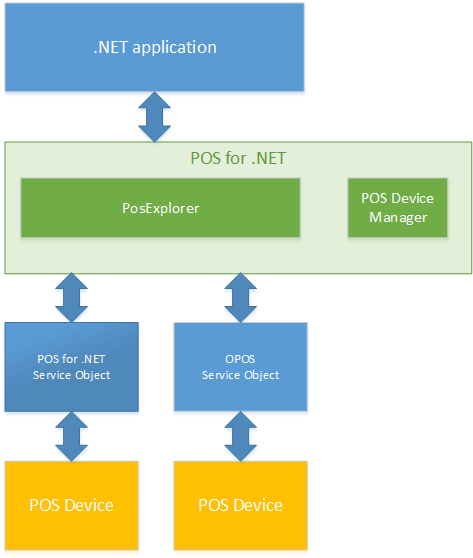Note
Access to this page requires authorization. You can try signing in or changing directories.
Access to this page requires authorization. You can try changing directories.
The Microsoft Point of Service for .NET (POS for .NET) architecture supports both developers writing POS applications and peripheral device hardware vendors writing .NET-based Service Objects. The following illustration shows the POS for .NET architecture.

Devices use service objects to communicate with your application by using the POS for .NET interfaces.
You can use the PosExplorer Class to discover and instantiate service objects. Once you have an instance of a service object, you can use that service object to interact with the POS device.
Plug and Play devices automatically notify PosExplorer when those devices are connected or disconnected. For non-Plug and Play devices, you can use the POS Device Manager to manage how PosExplorer discovers those devices.
Support for POS Applications
The POS for .NET public API provides POS applications with information about connected POS devices. The public API also creates instances of the Service Object (SO) classes for interacting with the devices.
POS for .NET uses Plug and Play for Windows Embedded to detect POS device connection and disconnection. The public API conveys Plug and Play events to the application.
For older applications, the POS for .NET legacy interoperability system exposes legacy OLE for Retail POS (OPOS) controls as .NET Service Objects.
For more information, see POS for .NET API Support.
Support for Service Objects
Hardware vendors write device-specific Service Objects that interact with peripheral hardware. The Service Objects also implement interfaces as specified in the Unified Point of Service (UnifiedPOS) v1.14 standard. With POS for .NET device classes, hardware vendors can concentrate their efforts on implementing the device-specific details.
POS for .NET offers abstract Basic device classes for every device type defined in the UnifiedPOS specification. The enhanced Basic classes, called Base classes, supply functionality common to all POS devices. POS for .NET provides abstract Base device classes for nine devices. The Base classes further implement core POS functionality specific to the particular device class.
POS for .NET supplies Base classes for the following devices:
- Cash Drawer
- Check Scanner
- Keyboard
- Line Display
- Magnetic Stripe Reader
- Pin Pad
- Printer
- Scanner
- RFID Scanner
See Also
Concepts
- Typical POS Application Architecture
- POS for .NET Integration with Plug and Play
- Supported Device Classes
